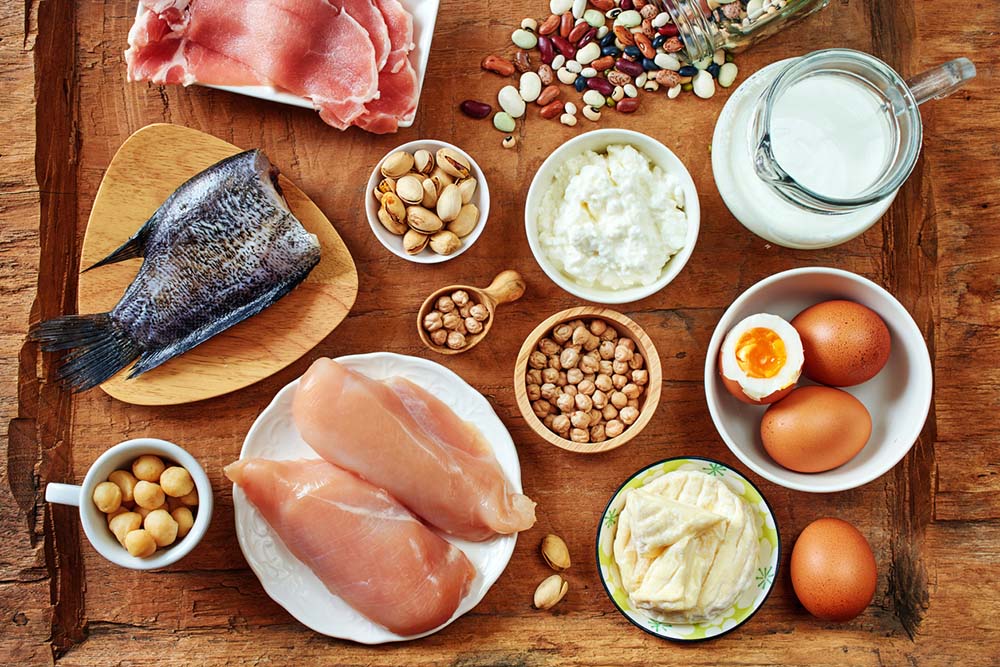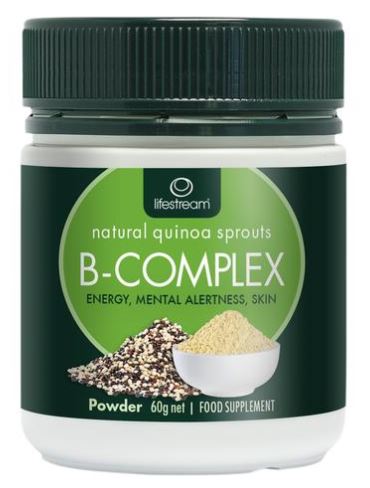Do you find it hard to focus? Turns out B vitamins may be what you need. Nutritional Director Rick Hay explains why B vitamins are so important and how you can increase your intake.
Have you ever sat at your desk and, no matter how hard you try, you just can’t focus on the task at hand? Maybe you think it could be due to lack of sleep, memory loss or low energy levels? Maybe you think you need a coffee or some sugar or ten hours of sleep.
But it turns out, vitamin B could be the answer to your concentration prayers.
B vitamins to the rescue
‘If you are having trouble focusing, try increasing your intake of B vitamins,’ suggests Nutritional Director Rick Hay. ‘B vitamins are important for mental performance, the health of the nervous system and energy production.’
B vitamins are also needed to convert carbohydrates, fats and proteins from our diet to energy. When we are stressed, which is more often than not, our bodies respond by utilising our B vitamin stores to get more energy. Therefore over long periods of time, our B vitamin levels become depleted, which ultimately affects our focus and concentration.
B vitamins are important for mental performance
‘B vitamins are key when it comes to relieving stress. Many chemical processes that take place in the body require B vitamins, they play a key role in the conversion of amino acids into neurotransmitters for example,’ explains Hay.
B6 vitamins in particular, are essential for producing adequate levels of serotonin and dopamine, your brain’s essential feel-good neurotransmitters. They regulate mood, motivation and melatonin.
Melatonin is the sleep chemical in your body, so obviously when stress is prolonged, your sleep will suffer, and if your sleep suffers so will your concentration.

B vitamins are also great for our brain
A 2016 study from the US National Library of Medicine showed that B vitamins represent a group of eight essential dietary micronutrients. These work at a cellular level and are absolutely essential for every aspect of brain function. Simply meaning that our brains need vitamin B6 to work at all.
Vitamin B5 is also important. Vitamin B5 is also known as the anti-stress vitamin, as it helps with bodily processes that spike during the stress response, such as the production of adrenal hormones, cholesterol and immune antibodies.
Don’t worry about the cholesterol bit though. Hay reminds us that cholesterol production is not all bad, ‘We need cholesterol to produce new cells and steroid hormones such as cortisol that are part of the stress response.’
Our brains need vitamin B6 to function
B vitamins are also needed for the production of the memory neurotransmitter acetylcholine. This neurotransmitter helps us to calm down after stress has passed.
In order to use the amino acids that help to produce the neurotransmitters, a number of nutrients are required as co-factors.
You’ll need Vitamin B12, folate, zinc and magnesium to make sure the transmitters can do their jobs efficiently. ‘There are multiple studies linking both B12 and folate deficiency to mental health problems,’ says Hay.
‘These are the key nutrients involved in methylation, a process that helps the body make neurotransmitters such as serotonin and dopamine.
‘The formation of phospholipids, which are the building blocks of nervous tissue and myelin (the fatty sheath that insulates our neurons), are essential for brain health.’
Other studies have linked impaired methylation to depression, anxiety, bipolar disorder and schizophrenia.
A study from the US National Library of Medicine shows a correlation between low vitamin B12 status and major depression.

B vitamins can also improve memory loss, as shown in this study from Oxford where a B vitamin supplement slowed mild memory loss.
This is backed up by another study, that shows an association between the intake of B vitamins and memory function in elderly Koreans with cognitive impairment.
The results suggest that the total intake of B vitamins is associated with those affected by Alzheimer’s and mild memory loss, but that the association is stronger with Alzheimer’s.
Even if you’re not affected by any memory problems or focus issues, B vitamins are still massively instrumental to your daily health.
‘The more stress you’re under, the more B vitamins your body may be using up,’ Hay says
‘B vitamins are particularly important for the regulation of mood, stress, and metabolism,’ Hay explains. ‘Good levels of B vitamins can help reduce your tiredness and may even increase concentration and your ability to cope with stress.’
Long-term stress can result in symptoms such as jaw-clenching and teeth-grinding. This causes muscle tension around the face, which has been associated with lowered levels of vitamin B5.
B vitamin-rich foods
There are many ways to get more B vitamins. Some of them are made by the body itself, but vitamins B1, B2, B3 and B5 can’t be made by the body and are central to the energy production process.
‘The more stress you’re under, the more B vitamins your body may be using up,’ Hay says. So if you’re going through some extra stress right now, what can you do to get more B vitamins?
‘B vitamins are best taken as a complex,’ Hay explains, ‘but eating foods rich in B vitamins such as whole grains, spinach, kidney beans, chickpeas, lentils, quinoa, salmon, tofu, eggs and pecan nuts can also help.’
Here are some recommendations for getting more specific vitamins.
B6
- Carrots
- Chicken
- Eggs
- Fish
- Meat
- Peas
- Spinach
- Sunflower seeds
- Walnuts
- Avocados
- Bananas
- Beans
- Broccoli
- Brown rice
- Whole grains
- Cabbage
- Corn
- Potatoes
B5
- Beef
- Eggs
- Fresh veggies
- Kidney
- Legumes
- Liver
- Mushrooms
- Nuts
- Saltwater Fish
- Whole rye flour
B2, B6 and folates
- Whole grains
- Red meat
- Poultry
- Fish
- Eggs
- Milk
- Cheese
- Beans
- Lentils
- Sunflower seeds
- Almonds
- Broccoli
B12 is only found in animal products, so if you are vegan, make sure you supplement with this nutrient daily to avoid deficiency.
Why B vitamin supplements?
If you feel like you’re not getting enough vitamins in your diet, a supplement is a good idea.
‘If you lead a high stress life or avoid meat, eggs or dairy, you may not be getting your share,’ Hay says. ‘That’s where a supplement may help.’
Lifestream Natural B Complex (£38.54), is vegan and is sourced from quinoa sprouts.
‘It has a nutty flavour with each 2g serving providing good levels of vitamins B2, B3, B5, B6, B12 and biotin – and don’t worry about the taste, because you can add it to smoothies, juice cereal or just water.
‘It’s free from soy, dairy, gluten and wheat, so it can help you get your daily dose of B vitamins regardless of dietary restrictions.’
More Healthista Content:
Periods and exercise – How to sync your workout to your menstrual cycle
Are eggs healthy? Sorting the fact from fiction
5 endometriosis symptoms and exactly what can be done – the doctor’s guide2019
IBS? Constant coughs and colds? Antibiotics could be to blame
8 subtle signs you have low self-esteem
Like this article? Sign up to our newsletter to get more articles like this delivered straight to your inbox.






















































